Fallout 4 Review
It has been seven years since Bethesda last tackled the Fallout series, with the excellent spin-off sequel New Vegas being developed by Obsidian instead. One might expect in that time span Bethesda would have made an effort to work out some of the rather glaring wrinkles that made Fallout 3 and New Vegas feel so clunky. In some respects, they have; the shooting feels much better in Fallout 4, meaning that VATS is a sort of fallback option rather than your primary means of engaging enemies. They have also added some crafting elements that help incentivize exploration, which remains the best part of the game. However in most other regards, Fallout 4 is the same semi-broken, super ambitious open world game that Bethesda has been making since Oblivion; it has received a patchy new coat of paint and a few nice gameplay additions, but ultimately, it won’t change anyone’s minds about Bethesda’s brand of RPG.
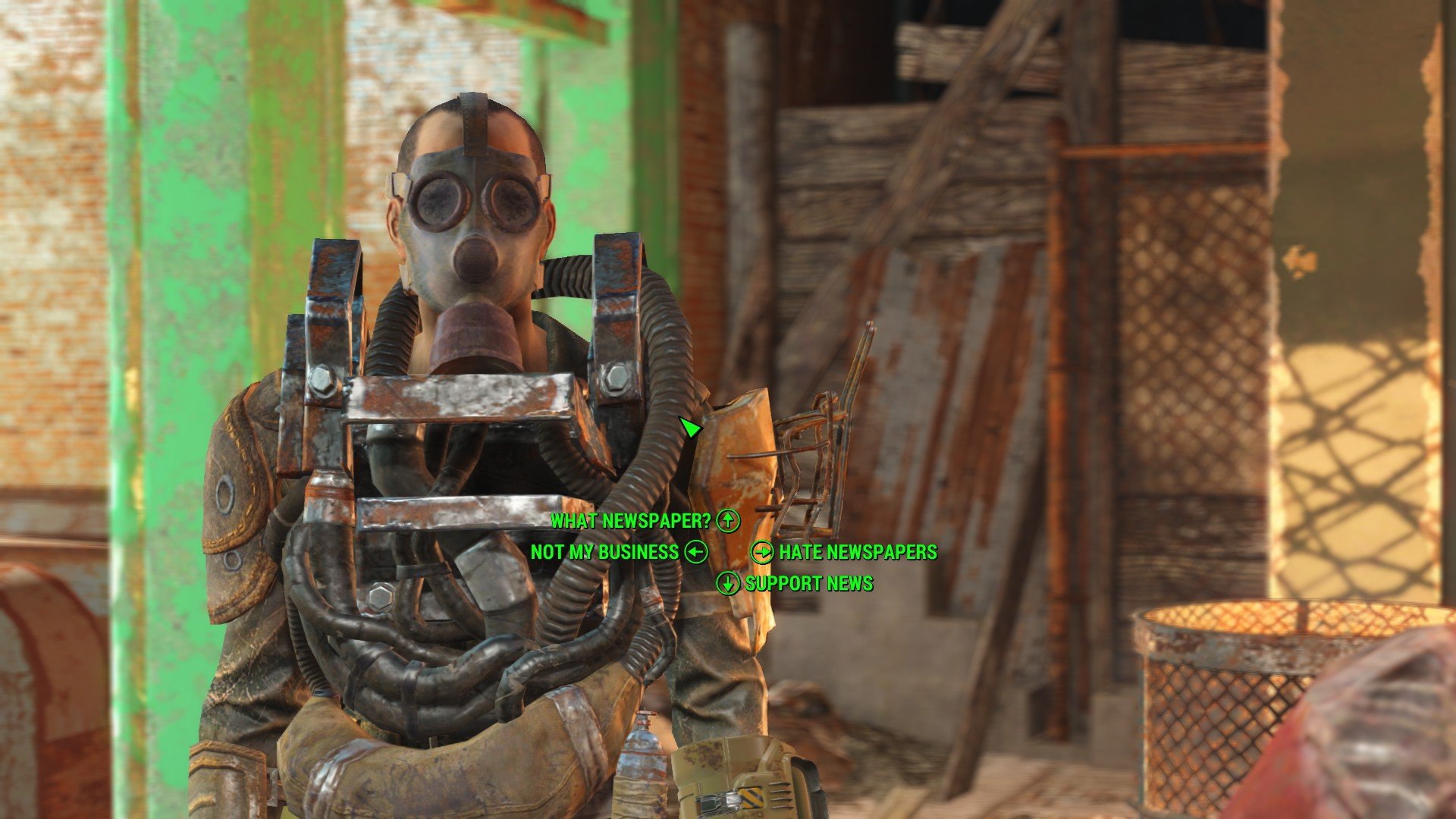
You’ll get used to having serious conversations while looking like a maniac
Story and storytelling has never been a strength for Bethesda, and Fallout 4 is no exception. The game gets off to a very rough start, with the intro taking place before the bombs fall, letting you soak in the flat writing, awful new dialogue system and stiff character animations right from the get-go. The game makes an effort to develop a bit of back-story for your now-voiced protagonist, with your son getting kidnapped early on, setting up the central hook for the main quest-line of finding him and seeking revenge against the mysterious group that did the kidnapping. After this introductory sequence, any semblance of narrative cohesion vanishes. Emerging from over 200 years of cryo-sleep, you almost immediately proceed to don a suit of power armor and engage in combat with a death claw; you are then given a clue as to your son’s whereabouts by a psychic woman who happens to be nearby.
This incredibly clumsy storytelling is nothing new from Bethesda, but in contrast to Obsidian’s narratively rich New Vegas or other modern RPGs, it is getting harder and harder to ignore. The story does eventually elevate itself from laughable to mediocre when it starts delving into some Blade-Runneresque science fiction tropes, but the flat writing and painfully dated animations make it very hard to get at all invested in the story or characters. To its credit, you do get to visit some neat locations throughout the story, and some fairly major choices do crop up later in the game, but by this point I just didn’t care about any of it, and the decisions rang hollow as a result. Given what other developers are doing with narratives in open world games, I simply cannot recommend Fallout 4 to anyone who is looking for a story driven experience. Fortunately, you can pretty much ignore the main story and still get a lot out of the game.
If you need even more reason to avoid the traditional quests, it is worth mentioning that I ran into some fairly egregious scripting bugs. At one point I needed to craft a bunch of equipment, and after building everything and wiring it together, my character repeatedly mumbled something about everything needing to be on the same grid. When in ‘crafting’ mode you can scrap most items in the world for resources, and after several hours of madly building generators and wires, it turned out my equipment wasn’t working because I hadn’t scrapped the carpet I built it on. Another time I completed objectives in an unexpected order which caused the quest to break, forcing me to reload an earlier save.
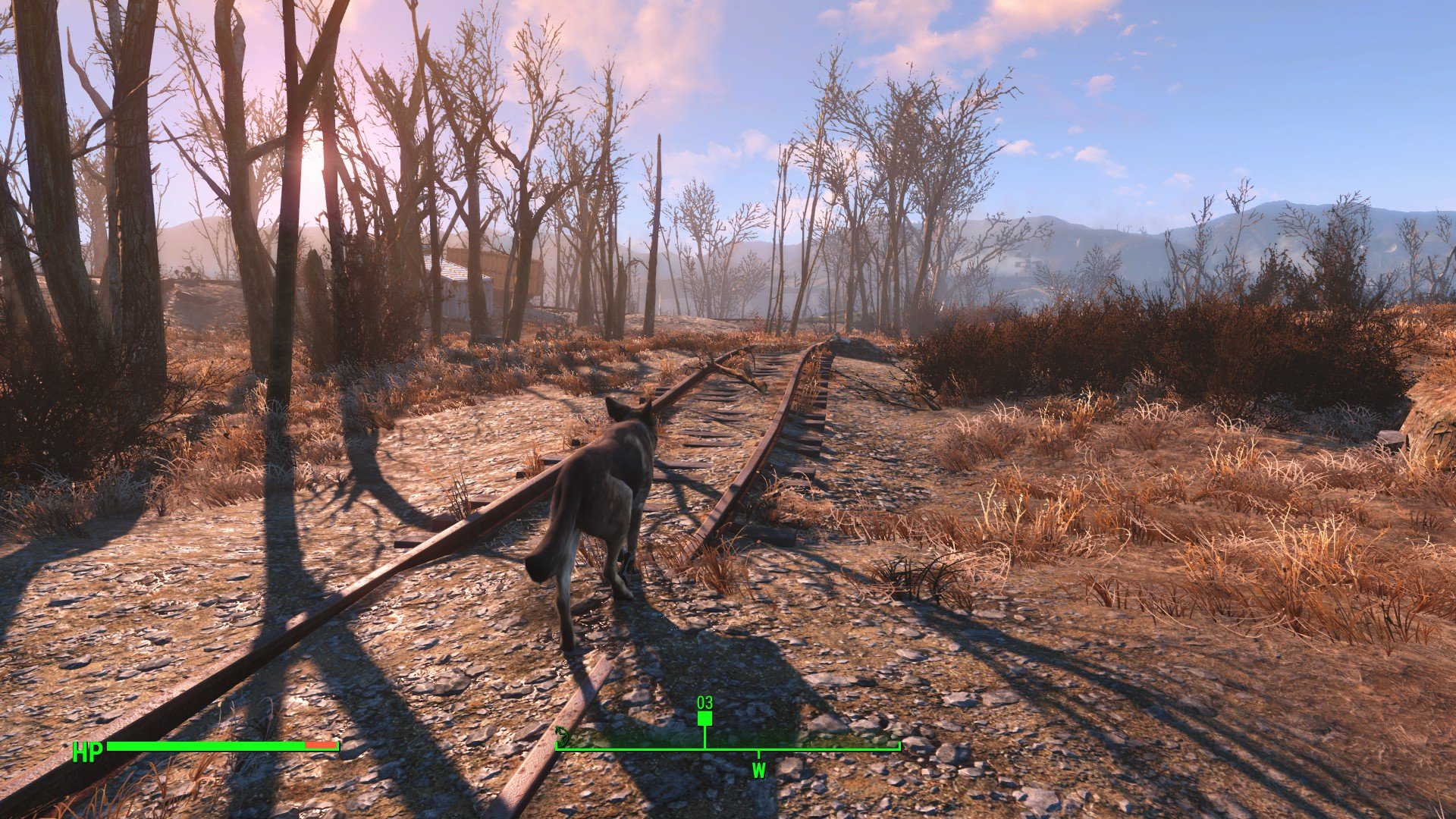
Dogmeat will sometimes lead you to a stash of hidden goodies
Fallout 4 takes place in Boston, and while I was initially a bit disappointed by the relatively modest size of the map, this quickly faded away when I realized how dense the game is. I can’t think of another open world game that has such a high concentration of stuff to do, and a large part of it isn’t necessarily quest related; the game has several systems in place that encourage exploration, and this is where Fallout 4 absolutely shines. The game is full of nooks and crannies stuffed with useful gear, and wandering around, sticking your nose into every location and hole is an intoxicating experience thanks to the captivating atmosphere and unique locations. Even after I thought I’d seen everything, I was always surprised when new quests brought me to areas I hadn’t seen before, a remarkable sort of in-filling that means almost no space is wasted. Vertical space is made great use of with tall towers and explorable overpasses littered stuff to poke at.
One aspect of Fallout 4 that also makes the early couple of hours a grind is that almost every mechanic in the game is dumped on you at once. Crafting is quickly thrown into the mix, with the bare minimum of instructions to guide you through the clunky menus and confusing interfaces that plague the game. Once you figure the system out it’s functional and lets you do some really neat things, but the learning curve could have been gentler. The same goes for the weapon and armor customization which you will need to figure out for yourself.
If you want to delve into the crafting and customization you will need to find certain parts for your creations and upgrades. These parts can primarily be obtained by breaking down existing objects, meaning you will need different objects to provide different parts. These objects come in the form of the random junk that clogged up the last two Fallout games, which is now useful and used to directly improve your settlements and equipment. You will find yourself going off scavenging for certain parts, adding further incentive to ignore the story and just wander around killing stuff and picking things up.
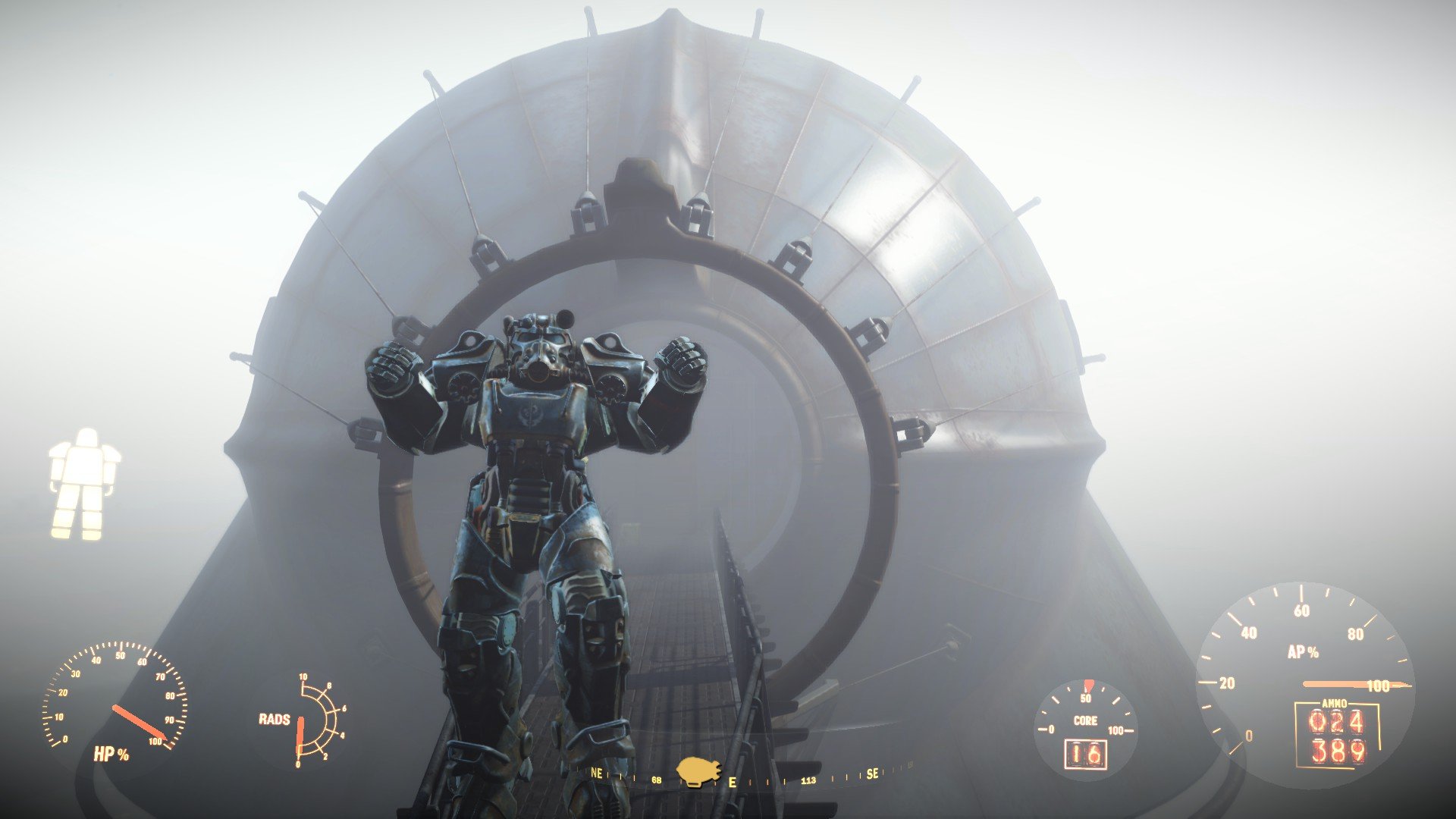
Finding enough fusion cores to use your power armor is cause for celebration
I found myself picking up almost everything in the hopes that somehow this pair of handcuffs will contribute to a new magnified scope for my sniper. Thankfully, you can tag crafting ingredients and they will be noted in items that contain them. As such, you end up carrying a lot junk and I would recommend investing in skills that increase carrying capacity early on. Character progression has been tweaked from past games; you now get a single skill point each time you level up. You can use this point to improve your base stats, or invest it in one of the many perks which mostly return from previous fallout games.
The new settlement building also adds a significant amount of depth. Early on you team up with a group called the Minute Men who are involved in establishing communities that they will then protect. You become actively involved in this, clearing out promising sites of ghouls or wildlife and creating a livable space complete with power, sustainable food/water and defenses. If this sounds appealing to you, then Fallout 4 can be played like a post-apocalyptic State of Decay where you manage a group of settlements and even establish supply routes between them. If you are near a settlement and get into trouble, you can fire a flare gun which will attract any nearby minute-men to come and help out.
No matter what facet of Fallout 4 you focus on, you will need to engage in a lot of combat, probably more than in the previous Fallout entries. Fortunately, the combat has seen significant improvements. Weapon handling is much better this time around, with great weapon sounds and even more impressive weapon variety gelling with well-balanced difficulty for consistently entertaining engagements. You can assign weapons and healing items/drugs to hot-keys, meaning you don’t need to go rooting around in your inventory every time you want to get healed or change weapons. You can also throw grenades or other explosives with a hotkey, rather than having to equip them exclusively.
One aspect of the combat that I have mixed feelings about is the relative scarcity of ammo, and the huge number of different ammo types and firearms. I never seemed to have a ton of ammo for any one weapon, so instead of heading out with two or three weapons, I found myself using seven or eight at any given time since I never had much ammo for any of them. This would lead to situations of frantically swapping between weapons, thinking “oh I don’t want to use my .308 ammo on these weak guys, better switch to my other gun that uses less powerful ammo.” It is nice to have the weapon variety and I really like how ammo is scarce enough that you need to use it wisely, but having to juggle so many different guns feels a bit ridiculous.
VATS returns, but has reduced effectiveness as it only slows down time rather than pausing it. It is still an essential system when fighting the annoying mutant insects who can make your life miserable, but ultimately it feels like a sort of special ability rather than the primary way to get through encounters. While the weapon handling is in line with a more tactical shooter, the movement is still fairly clunky. You can hide behind cover and will automatically peek out when aiming, but you will still get hung up on small objects and perform janky parkour maneuvers to get around the environment.
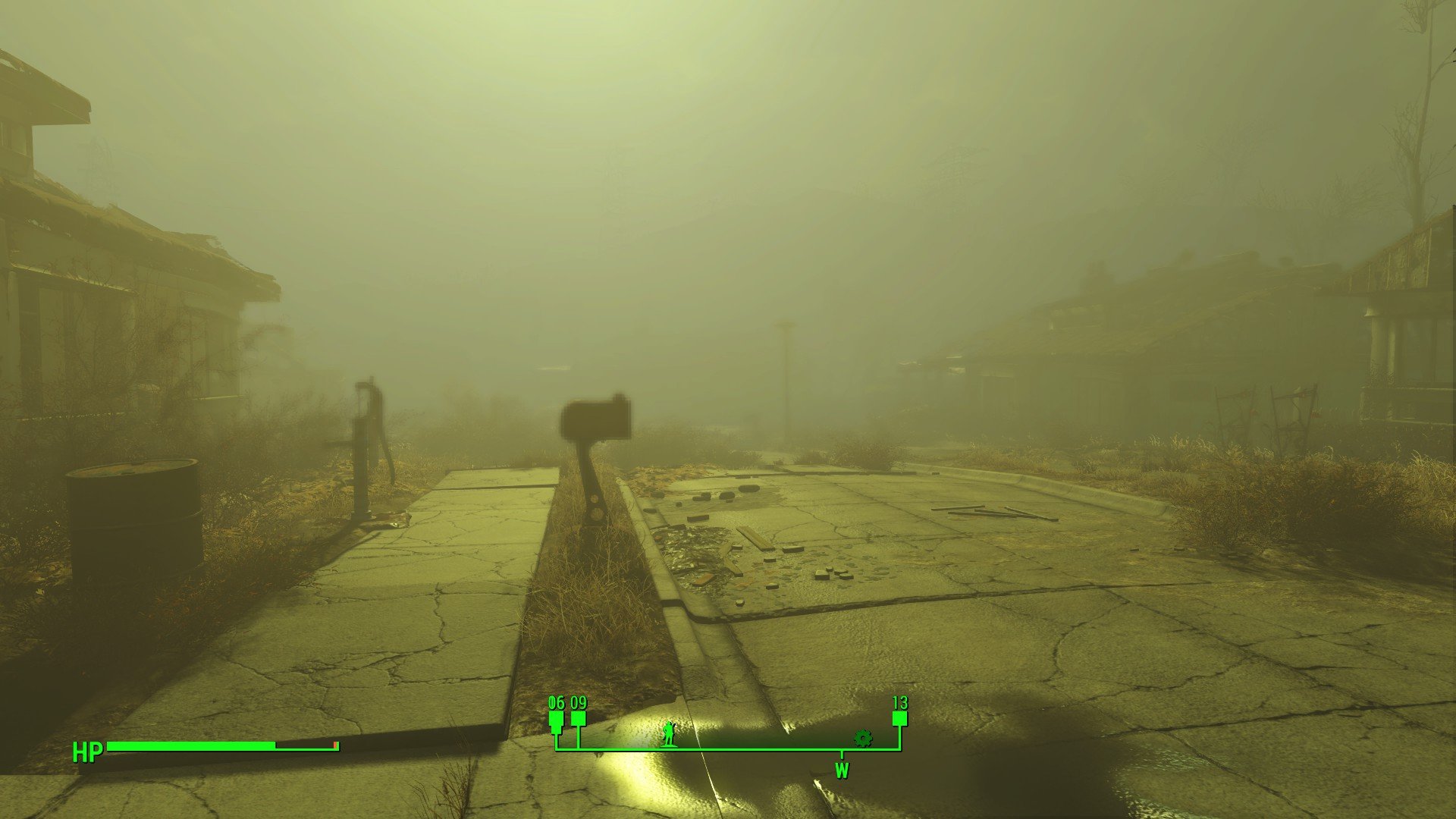
Nuclear blowouts reduce visibility and cause radiation sickness
You can climb into a suit of power armor if you need more durability and radiation resistance; these suits must be powered by ‘fusion cores’ which can be found scattered around, and these drain while using these suits. Power armor will also get damaged over time, and though all other item degradation is gone, it makes sense for the Power Armor, giving those occasions you do use it a heightened feeling of importance. The clunky movement feels justified when wearing the suit, and some of my favorite parts of the game occur in places where you need it for radiation protection.
The tendency of both enemy and friendly AI to break is a frequent problem that ruins immersion during combat encounters. When indoors, you might be engaged in a brutal noisy shootout with some raiders, only to have other raiders in the next room ten feet away loudly saying things like “did you hear something? What was that?” as if you were instead sneaking around. Feral Ghouls will impressively crawl through windows and other gaps in the environment only to become stuck on a fence or in a wall afterwards.
The AI companions that seem to exist in every Bethesda game are perhaps even worse; they will fail to keep up when you perform unexpected jumps to get around the cluttered environments, and are mostly useless in combat unless you gear them up with your own precious supplies. The game frequently uses elevators in indoor environments, and your NPC followers will generally get confused by the devices and get left behind. Your first companion, a dog, is introduced quickly; he sort of just pops out of nowhere and you start adventuring together, with him immediately able to follow complex commands. Your canine friend will help in combat and even lead you to some hidden stashes, but mostly he just gets in the way. Bethesda did go through the effort to create backstory for your companions, and if you spend enough time traveling together they will randomly pull you into a conversation and start telling you about their past, but mostly I found them to be clumsy and immersion breaking and usually traveled alone.
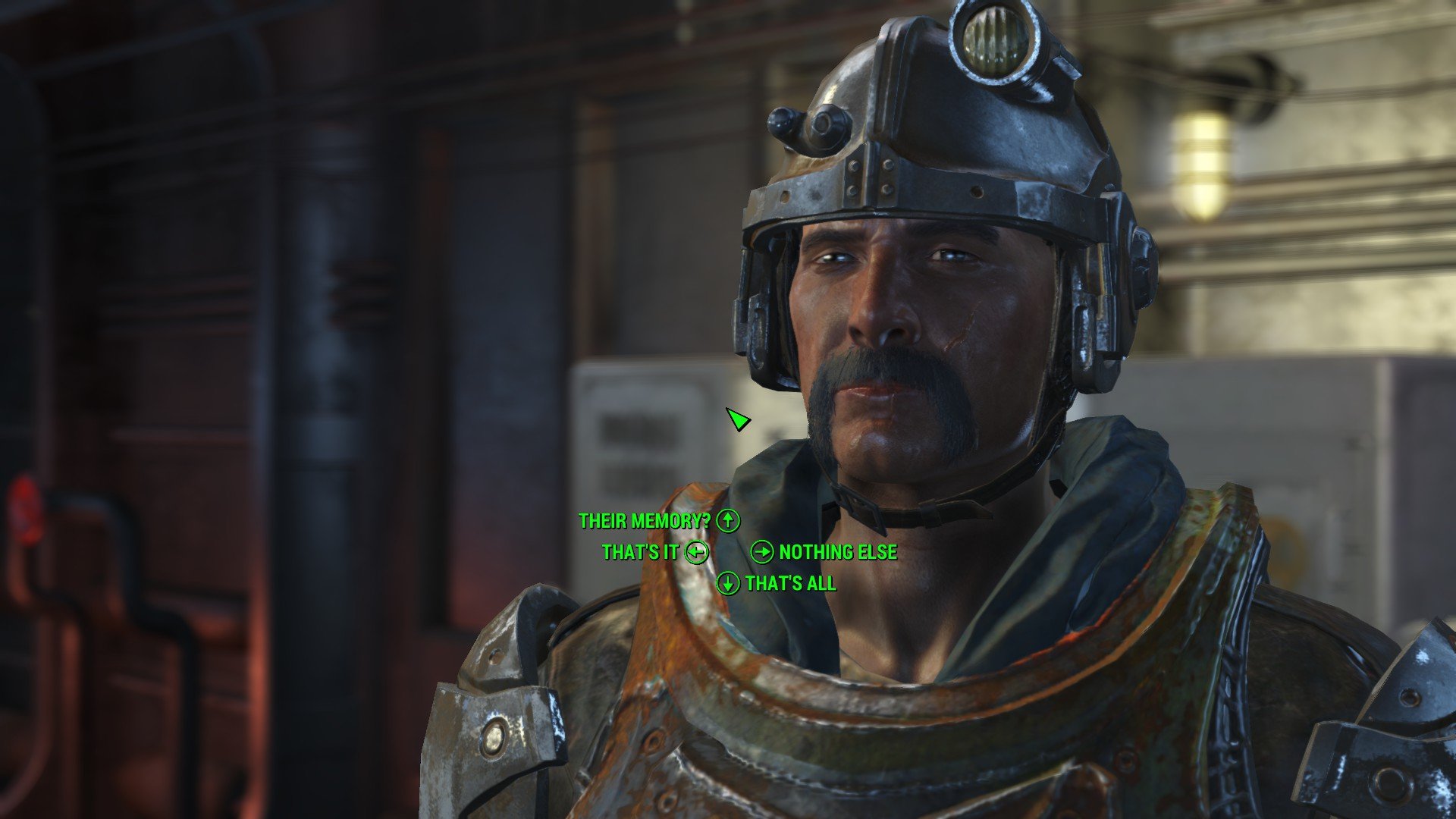
The conversation wheel leaves much to be desired
Despite the improvements to the gameplay, Bethesda still seem intent on having you spend a good deal of time in conversations with NPCs. They have scrapped the long-standing dialogue system of previous games and replaced it with a Mass Effect-style dialogue wheel. Sadly, the new dialogue system is a bust, partly due to the stilted writing, partly due to the dated facial animations and broken lip syncing, and partly due to the limited options of the wheel. Many dialogue options are redundant, with NPCs responding in the same way to different choices.
Other times, the dialogue options don’t do a good job of indicating what your character will say at all. I chose an option that resulted in an entirely different response than expected on a few occasions. Time doesn’t pause during conversations, and random NPC’s will start talking to you and drown out the important dialogue, or bump into you or the person you are conversing with. As it stands, the conversations simply aren’t good enough to justify the time spent in them. Bethesda either need to pare them down or make them better, rather than rubbing our faces in how behind the times they are in this aspect of their games.
Fortunately, the rest of the game’s presentation fares much better. One of my favorite additions in Fallout 4 is dynamic weather; rain, fog and nuclear blowouts add to the atmosphere in a meaningful way and create moments of unscripted, haunting beauty that will stay with you long after you stop playing. Again I can’t overstate how deliciously detailed and rich the world is to explore; it has an intangible, grounded quality that very few games have, cemented for me at points where you climb up the taller towers in Boston and look around at the map, able to distinguish different locations you have visited and scout out new areas to venture. Taken as a whole, Bethesda’s vision of post-apocalyptic Boston is an enthralling one.
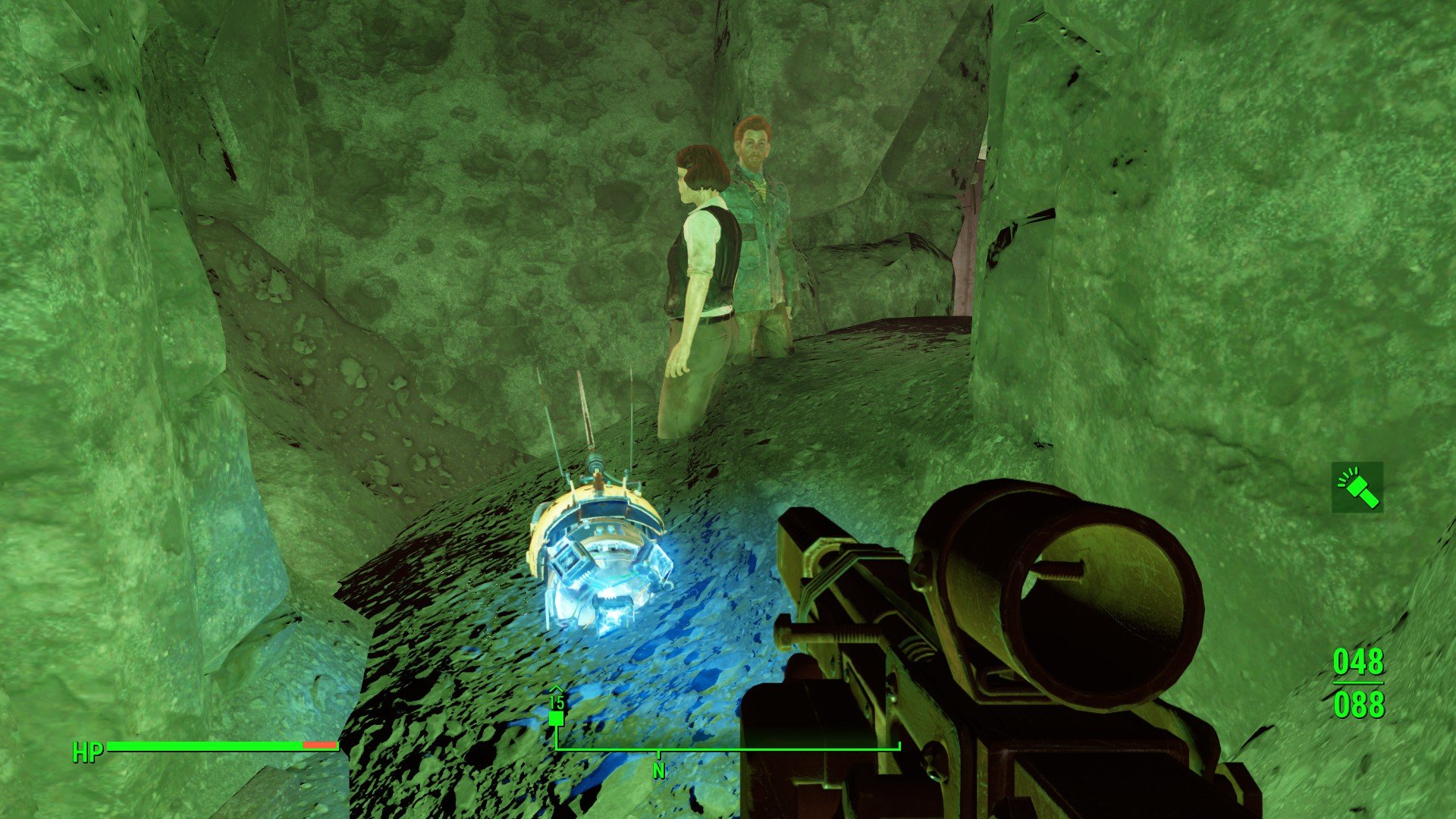
Missions involving NPC companions show Fallout 4 at its buggy worst
From a technical standpoint, there are a lot of inconsistencies when you start looking closely, revealing the fact that Bethesda have been working with the same engine for a very long time now. You still need to endure loading screens when entering towns, buildings or fast traveling, and these can be quite lengthy if you aren’t running the game from a SSD. When you add up the glitches, painfully dated animations, the performance dips that occur in cities and the amount of loading, it’s hard to figure out why Bethesda haven’t bothered to invest in a new engine, especially in light of other open world games that both look and run better. Even though things look good from a distance, the dated tech Fallout 4 is built on rears its ugly head all too often.
On a brighter note, sound design is very much on point; firefights are brought to life with sonic cracks and you can even tell what kind of surface is being hit by bullets simply by the sound of the impact. The distinctive static of your Geiger counter will tell you when it’s time to get the hell out of your current location, while the moody soundtrack heightens the darkly wondrous tone that permeates the whole experience.
In many ways, Fallout 4 feels a bit like a game that belongs on Steam Early Access; impossibly ambitious, a bit broken and painfully clunky. Yet somehow, despite the weak storytelling, bugs and dated technology, the game is frequently a joy to play, with some of the best organic exploration you can find in the medium. To make things even better, the game does a great job of incentivizing this exploration, giving you plenty of reason to ignore the tedium of the story and venture off into the unknown. If Bethesda want to retain their status as a top-tier open world game developer, they really need to improve their ability to tell an engaging tale, but despite this serious failing, Fallout 4 still somehow managed to win me over.
